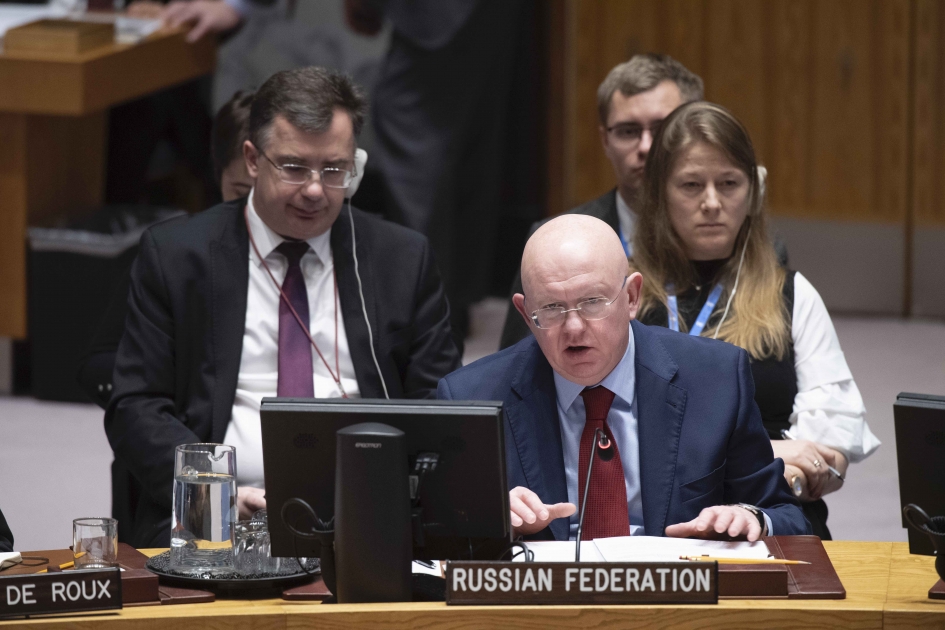Statement by Permanent Representative Vassily Nebenzia at the UN Security Council Meeting on agenda item “Peacebuilding and Sustaining Peace: Transitional justice in conflict and post-conflict situations”
Mr. President,
Belgium suggested for consideration a very important issue. We are grateful for that.
We welcome Ms. Bachelet, as well as the other rapporteurs, and thank them for their contribution to the debate on the issue of transitional justice in conflict and post-conflict situations for building and sustaining peace.
The approach articulated in the agenda of our meeting seems to be right: it is important to identify the role and the most useful forms of transitional justice for achieving the overarching goal of lasting peace and preventing a relapse into conflict.
Internal armed conflicts are the predominant form of the use of military force in today's world. There is a dangerous trend of military proliferation that is observed in the context of, or as a result of displacement or destabilization of legitimate governments through external intervention.
Conflicts do not arise out of the blue. Therefore, solving a conflict we need to understand its root causes. Transitional justice is not always a key to peace. It is important not to go too far in prescribing the same medicine to all patients, regardless of the diagnosis and symptoms of the disease.
However, that does not mean that a variety of tools provided by transitional justice should not be used when needed. This concept is a multidimensional phenomenon that includes not only legal, but also political mechanisms as well as national and international efforts needed to establish peace in a country. However, we are not sure that the Secretary General's guidance note on UN Approach to Transitional Justice (2010), prepared without the participation of Member States, constitutes in all respects a correct embodiment of this concept.
The UN has gone through various stages in the use of transitional justice tools. In the early 90s, many hopes were placed on the ICTY and ICTR, established by the Council. But already in the early 2000s it became clear that this mechanism was not effective. Despite various political statements by different States, real assessments of the effectiveness of these bodies seem to be in general similar. The Council first agreed to their costly reform, known as the "completion strategy", but then gave up the idea of further proliferation of such mechanisms.
Attention of the international community then shifted to the ICC. This institution seemed attractive to many because, unlike ICTY and ICTR, it was based on the complementarity principle. It means that it was supposed to complement the national justice rather than to substitute it. However, the ICC future work showed that the idea of complementarity remained dead letter, and the general trend towards politicizing the work of international judicial bodies manifested itself in its ugliest forms.
So far, the Nuremberg Tribunal has been the most significant international achievement in the fight against crimes against peace and humanity. It was established with the consolidation of will of all allies in the anti-Hitler coalition and with the special role of the USSR, and based on the principles of open and fair trial. This Tribunal needed neither a "completion strategy", nor extremely costly special measures to "preserve the legacy" - Nuremberg verdicts are indisputable, despite the passage of time.
Let’s go back to our time. By the mid-2000s, it became clear that the most effective forms of transitional justice were those based on national dialogue in a country affected by conflict, and complemented by UN efforts.
Post-conflict recovery is not possible without regard to local traditions and national character: sometimes reconciliation goals can be achieved by the Truth and Reconciliation Commission alone, but sometimes we need to resort to "traditional mechanisms", such as Gacaca courts in Rwanda.
As far as lasting national reconciliation is a determining factor for the successful resolution and prevention of recurrence of the conflict, we believe that the United Nations should focus on finding appropriate forms of technical assistance to rebuild national justice and national law enforcement systems torn apart by conflict.
In this process, the United Nations should be a contributor of best practices; it should offer solutions rather than create problems. In this regard, it is not always appropriate for the UN to make unequivocal demands, such as unacceptability of amnesties, prevalence of the international component in mixed judicial institutions, etc.
With regard to transitional justice, it is important to discuss openly cases of misuse of its tools. In UN documents, related mechanisms are normally praised. Criticism may refer only to the lack of political support, underfunding or insufficient role of victims in these processes.
Meanwhile, transitional justice mechanisms should not be used for ensuring the victory of one party to the conflict over another one or for political score settling. Nor should they be used for interfering in the internal affairs of a conflict-torn State.
We should distinguish transitional justice from direct political manipulation under the guise of the fight against impunity, that to my regret has put down its roots also in our Organization. A notorious example is the illegitimate mechanism to investigate crimes in Syria.
The real contribution to ensuring accountability of foreign terrorist fighters, including those operating in Syria, would be their repatriation and exercise of jurisdiction in national courts in accordance with counterterrorism conventions and the "extradite or prosecute" obligation enshrined therein. Of course, all that should be done in accordance with the principle of inevitability of punishment and proportionality of the sentence to the offence committed.
Mr. President,
We are convinced that for the Security Council the issue of transitional justice is not an attempt to find a universal formula, but systematic work with specific country situations and mandates of peacekeeping and political missions. The United Nations should not dictate. It should encourage and complement national initiatives.
Thank you.
